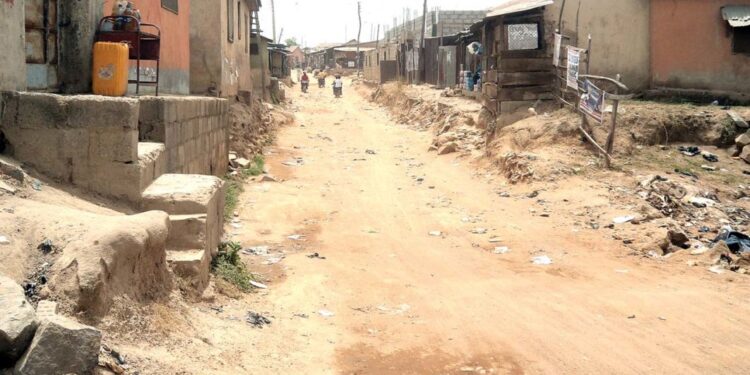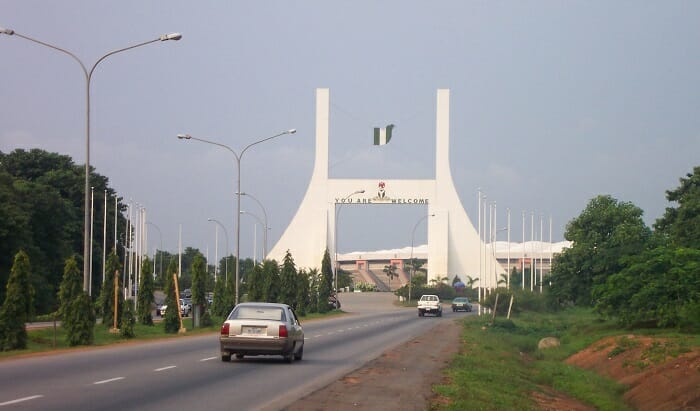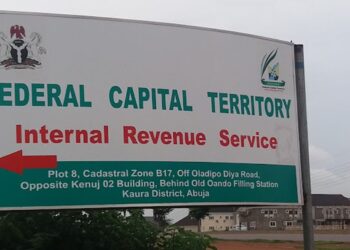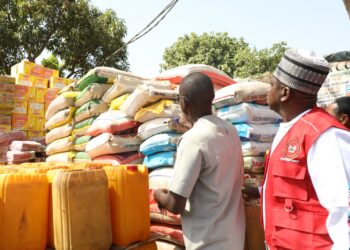It is the irony in its name that first strikes you when you get to the area called Kings and Queens in Bwari, Federal Capital Territory (FCT).
There is nothing royal about the area as you will find a cluster of crowded houses too congested for cross ventilation on a rocky, slovenly path that if the bike man carrying you is not careful enough, both of you may fall off the bike.
In this community is a single mother of about 31 years old, who stays in a single room with no kitchen and where she shares a toilet with her neighbours.
Ms Omi Ede is a single mother from Benue State in her early thirties, who works as a waitress in the Wuse area of Abuja and also runs a personal business.
She is a graduate and earns an average of N120,000 monthly from her regular job as a waitress and her aside business as a crocheter.
In a country battling with high inflation where many Nigerians spend most of their income on food, it is not surprising to find her staying in the Kings and Queens area of Bwari.
When asked how she ended up in the area, Ms Ede, said, “My budget could not get any house in town because of the agent fees, caution fees, and all of that. So, I had to come to Bwari, and I got something cheaper, something I could manage for now.”
She added that rent in Abuja town is ‘’too outrageous” for someone like her, so she ended up at her current place, which costs her N50,000 annually.
To get a place like hers in town (although with kitchen and toilet included), one may require about N500,000 to N1.2 million as rent, aside from agent fees and other accompanying expenses.
This means that someone like Ms Ede will likely need to spend more than her annual salary to rent a self-contained single room in the Abuja megacity.
But if she does that, how would she feed herself and her 10-year-old daughter? How would she transport herself to work and cater for other basic needs?
So, staying in the Kings and Queens area seems ideal, even when she struggles with access to water as she has to pay truck pushers, popularly known as mai ruwa, to get water for bathing and house chores. With a house on a hill, she has to pay more every week for her and her daughter.
As she speaks with Nairametrics, you can observe the exhaustion in the slouch of her body circles of sadness around her eyes, and a kind of yearning for a better environment, a better life.
Every day, she lives in fear of either her or her child falling sick from the water, the source of which she does not know, or the pile of waste that litters her environment.
A stroll around King and Queens in the hot sun of the FCT shows evidence of poor waste management and open drainage systems, which contribute to pollution and environmental degradation in an overcrowding environment.
In the absence of an efficient public waste disposal system, residents of the area have turned to hiring itinerant refuse collectors. These collectors move from house to house, transporting waste in wheelbarrows, providing an informal yet essential service to manage the growing waste burden.
Speaking on this with concern congealed in her voice, Ms Ede said, “Waste disposal is difficult here. Most of the time, we have to wait for all these mallam that throw dustbins. I don’t know where they throw the dustbin. But they have a truck and go street to street, looking for people that want to throw their dirt.
“So, if you are lucky to be at home the day they come, you will just pay money. Anyway, my environment isn’t clean. You know it is a trenches kind of place, so it is very very common to see dirt everywhere, especially when it rains. People tend to throw their dirt out when it rains so that the water brings it down. You know it is hilly, and this leaves everywhere messy after the rainfall.”
According to the World Health Organisation (WHO), poor waste collection contributes to both environmental and marine pollution, while also clogging water drains.
This blockage can lead to flooding and stagnant water, creating ideal conditions for diseases like cholera and vector-borne illnesses such as malaria and dengue. It added that environmental pollution and other environmental risks lead to nearly a quarter of the worldwide disease burden.
This puts the lives of Ms Ede, her daughter and those living in places like Kings and Queens at great risk of diseases.
Uncomfortable with her stark reality, Ms Ede had hoped to move out of the house this year, but she noted that it is no longer possible for her as she can barely afford the high costs of houses in town.
Ms Ede’s case is not uncommon in the capital city, where the high cost of rent in formal housing markets has forced over 60% of the population to live in informal settlements in places like Mpape, Kpaduma, Daki Biu, Kabusa, Apo Duste and Bwari.
These areas are characterised by overcrowding, poor sanitation, and lack of basic amenities, which put dwellers at great risk of frequent health issues like cholera and respiratory diseases.
For Mrs Oluchi Eze, wife of a struggling pastor, who stays in an uncompleted building with six children in Sheriti Village, Kabusa, all she prays for is enough money for a better house and food for her family, even as her children constantly fall ill due to malaria or typhoid.
Jobless and uneducated, she goes around Abuja begging to support her family, risking getting arrested as the Minister of FCT, Nyesom Wike has threatened to arrest street beggars in the city. Her husband has no other job but the work of God, which he does roaming the streets with his loud voice to win souls for Christ as his family struggles to survive.
Before ending up in an uncompleted building in a slum in Kabusa, the family was paying N250,000 for a one-bedroom apartment in the same area, where they have lived for over six years. But they were eventually evicted as they were unable to pay the rent, and now they battle sun and rain in an uncompleted building, relying on prayers and self-medication to deal with any health challenge.
With a worn-out face and body looking malnourished, she lamented, “rain beats us, we are just suffering. After it rains, we bring our foam to dry as the sun is coming. It has not been easy at all.”
This family also struggles to get water, as she said, “no water there o. I will carry my gallons and trek to where they are selling water and buy.” Her children also supported her in fetching water from a distant borehole, which they used to cater to their necessary needs.
Affordable housing is crucial in achieving the Sustainable Development Goals (SDGs) globally, even in Nigeria. It is about six years to 2030, which is the target year under SDG 11 to ensure access for all to adequate, safe and affordable housing and basic services and upgrade slums.
The hope of achieving this goal may become a mirage day by day as many struggling Nigerians like Ms Ede and Mrs Eze remain trapped in slums, unable to afford a decent house for their families.
But as seen in the stories of Kings and Queens and Sheriti, it is not only the SDG 11 target that may be a mirage, as the health, sanitation and environment targets might not be met.
Abuja is responsible for at least 10% of the housing deficit in the country, which stands at 17 million, with the likelihood of the figure increasing to 22 million by 2030.
The average cost of a three-bedroom flat in highbrow areas like Maitama, Asokoro, Wuse, and Jabi ranges from N4 million to N6 million per annum, while one-bedroom apartments are priced between N1.5 million and N2 million annually.
In contrast, satellite towns such as Mpape, Katampe, Lugbe, Karmo-Dape, Gwagwa, and Gishiri, among others offer more affordable options, with three-bedroom flats costing between N700,000 and N1.5 million, and one-bedroom apartments averaging N500,000 annually.
However, the steep cost of rent in Abuja has driven many to erect makeshift homes, resulting in the proliferation of shanty towns that disrupt the city’s master plan.
This housing crisis has contributed significantly to Abuja’s deficit, forcing many residents to live in slums or face homelessness, while numerous high-end houses remain vacant, deteriorating in upscale areas due to being priced out of reach for the average resident.
Developers and property owners often aim to attract only high-net-worth tenants, such as those in the oil and gas sector, corporate executives, expatriates, and celebrities. This leaves out a large segment of the rental market that could afford the rent but doesn’t meet the specific criteria set by these landlords.
The ripple effect is evident in increased traffic congestion, as residents from satellite towns commute daily into the city centre. Abuja’s housing deficit currently stands between 1.7 million and 2 million units, with authorities identifying over 600 abandoned buildings—most notably in Gwarimpa, Wuse, Garki, Maitama, Asokoro, and Apo.
Abuja is widely regarded as Nigeria’s most meticulously planned city. While authorities in the FCT attribute the rising number of slums to the unexpected population surge, which has led to the overstretching of the city’s infrastructure beyond its original capacity, housing experts say the economy has a role to play in the expansion of slums in the capital city.
Slum as a product of the economy
One of such housing expert is Mr Festus Adebayo, convener of the Africa International Housing Show (AIHS) and a leading housing advocate promoting affordable housing in Africa. In a telephone conversation, he observed that “the slum is a product of the economy.”
A similar sentiment is shared by the Head of Research at SBM Intelligence, Ms Bunmi Bailey.
Explaining the major reason for high rents in cities like Abuja, she said “Inflation is the major reason why rent is increasing.”
She also agreed with the authorities that the rising influx of people into the city contributes to the spread of slums in Abuja, as many low-income earners will not be able to afford the high cost of rent in the city.
Over half of Nigeria’s population (63%) is multi-dimensionally poor, with many relying on dung, wood, or charcoal for cooking instead of cleaner energy sources. Nationwide, severe deprivations persist in sanitation, access to healthcare, food security, and housing.

Out of the 133 million multidimensionally poor Nigerians, 1.59 million stay in the FCT, according to 2022 data from the National Bureau of Statistics (NBS).
Although the FCT houses about 1.2% of multidimensional poor people in Nigeria, it ranks among the top 20 most expensive states in Nigeria and reports some of the highest inflation rates, further exacerbating poverty.
The Consumer Price Index (CPI) data from the NBS highlights that housing costs are the second-largest contributor to headline inflation, trailing only food prices.

In September 2024, Nigeria’s headline inflation rate climbed to 32.70%, reversing the temporary relief seen in July and August.
This represented a marginal rise of 0.55% from August’s 32.15%, underscoring persistent price pressures. On a year-on-year basis, inflation surged by 5.98 percentage points, up from 26.72% in September 2023.

Rising inflation, coupled with exorbitant housing costs, continues to widen Nigeria’s housing deficit, particularly in cities like Abuja, forcing many into slums and informal settlements as affordable living options dwindle. A development economist, Dr Aliyu Ilias, said, “Once a landlord hears that things are expensive, they want to transfer the costs to the tenants.”
He stressed that with the lack of affordable houses in Abuja, poor Nigerians are forced to stay in less developed areas, driving slum expansion.
Reverberating the same view, Festus Adebayo said, “The problem with housing in recent times has to do with affordability. The people that really, really need houses cannot afford the houses. The situation is getting bad.”
He mentioned that in the past, the major concern was lack of affordability in buying of houses, but the focus has shifted to lack of affordability in renting houses. The lack of affordability housing options has pushed and kept more Nigerians in slums in cities like Abuja.
According to the World Bank, Nigeria has a high proportion of urban residents living in slums, with 49% recorded in 2020. In comparison, Togo has 39%, while Rwanda reported 38%. Both Ghana and Cameroon have identical figures, with 33% of their urban populations living in slums. Senegal recorded a slightly lower percentage at 32%, and South Africa has the least, with only 24% of its urban population residing in slum areas. This data highlights Nigeria’s significant urban housing challenges relative to its peers.
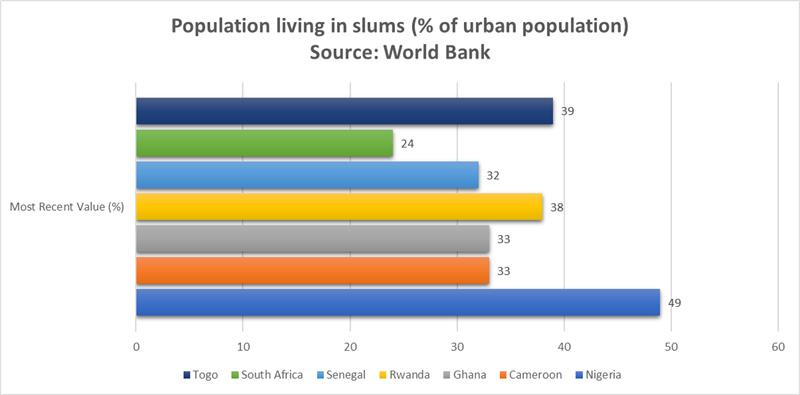
In a study by Jonas Eze of the Department of History and International Studies at the University of Nigeria, Nsukka, he highlights that while slums and squatter settlements are not new to urban growth worldwide, what sets Abuja apart is the alarming rate at which these issues are emerging in the city. The lack of minimum living standards in these settlements poses a significant threat not only to the residents of the slums but also to the broader population of the Federal Capital Territory (FCT), Abuja.
The study also noted that there are at least 26 slums and squatter settlements within the FCT. It noted that Abuja, Nigeria’s Federal Capital City, was originally designed to accommodate a population of 1.6 million. However, the city and its satellite suburbs house over 6 million people.
In Abuja’s slum areas, rapid urbanization and rural-urban migration have driven housing shortages, further exacerbating the issue by expanding informal settlements faster than urban planning can accommodate.
This led the Surveyor-General of the Federation, Mr Abdulganiyu Adebomehin, to say that the Federal Capital Territory is fast turning into a slum. He stressed that the ugly trend must be addressed, calling for a proper solution to correct the anomaly.
Nigerians in slums are often involved in low-income jobs, with many of them uneducated, battling overcrowding, poor sanitation, lack of access to clean water, and inadequate waste management systems, which contribute to health risks such as waterborne diseases and respiratory illnesses.
Slum dwellers also battle with weak infrastructure, including limited access to electricity, substandard housing, and inadequate road networks, leaving many residents isolated and vulnerable during emergencies.
There is the case of Mr Yusuf Bitrus, a 40-year-old, primary-school-educated bike rider. In a slum in Kabusa, he has stayed with a wife and two children since 2015, battling poor access to water and bad roads. His daily earnings of about N10,000 to N15,000 are often spent buying petrol from the black market for his bike and feeding his family.
After taking the journalist across Kabusa, he parked his bike at a corner with shade to tell his story. He said, “The area where I dey for kabusa, we no water. Bolehole wey dey there na from another area, and we dey pay for am. Light to no dey steady. The road is no good at all. Even motor no go fit pass there. People dey trek. Na only Hilux fit past the road. Small small motor no go fit go that area.”
He added that in his area, a single room is about N50,000 while a self-contained is about N250,000. His only request was for the government to help provide better roads for easy movement for people in his area. Every day is a struggle with weak infrastructure and a lack of good roads for him and everyone living within his community.
Beyond this struggle, there is the issue of insecurity. A 2014 study by the National Space Research and Development Agency (NSRDA) showed a positive correlation between slum settlement and crime in Abuja. Some of the common crimes identified include burglary, theft, robbery, aggravated assault, rape, and drug-related crime.
Attesting to the high crime rate in his area, the bike man, Mr Bitrus said, “Security no dey there. Those bad boys, na them dey disturb us for that place.” He added that sometimes, people in the area gather money to pay vigilantes to secure the area whenever it seems crime is rampant.
The challenge of insecurity was also mentioned as a major issue by another slum dweller in Nata Camp, Apo. Mrs Ini Clem, a local schoolteacher. Nata Camp is a community situated within the Apo district in Abuja, It is located behind the Apo Mechanic Village, a prominent area known for its extensive auto repair services and spare parts market.
The area comprises residential accommodation, including one-bedroom apartments and room-and-parlour units, catering to individuals and families seeking affordable housing options in the vicinity.
Nata Camp is known for high crime rates due to inadequate law enforcement presence and economic hardships faced by residents.
Expressing her major concern, Mrs Clem shared a personal experience of how the one bedroom she and her husband stays in was burgled on an afternoon when no one was at home. She said, “We were burgled in our houses, and this happens regularly during the day.”
According to her, when her husband complained to the police about the burglary, the police advised them to leave the environment.
“The insecurity is crazy, the robbery is crazy. The fighting is crazy. The noise, the environment. You can’t even raise a child there,” she added.
Affirming the high crime rates in slums, Festus Adebayo, the leading housing advocate, described slums as “the home of crime.” He said that living in slums is a big problem, noting that there is a correlation between housing and security.
He noted, “That is the home of anything you can think of as bad because it is a home where people struggle for survival.
“Slum is the home of criminals. It is where the criminals stay to go out and commit their crimes. The majority of the kidnapped and criminal cases that have been recorded in FCT have been recorded in the slums and in the outskirts of the city. It is where you see one chance operating on a daily basis.”
The Need for Affordable Houses for Poor Nigerians
The development economist, Dr Aliyu Ilias, stressed the need for government regulations to help control the random rates at which house rents are being increased.
He further called for the development of slums in Abuja to make life better for people there.
According to a news report, the Minister of the FCT, Nyesom Wike, in September 2024, attributed the rising cost of housing accommodation in FCT to market forces.
Mr Wike said, “You are aware that everything has actually increased. The man who built the houses didn’t build that he will not make a profit at the end of the day.”
“I don’t agree with people always complaining about rent increases. There are increases in everything today. So, rent should not be singled out.
“You want us to make a law and say that a 2-bedroom flat should not be more than N50,000 or N100,000 for example. I don’t think that will encourage investors.
“We are not running a socialist or communist system; we are running a capitalist economy, and these are determined by market forces.”
The minister, however, added that the government could come in with some regulations, saying, “but cannot totally take over the housing processes.”
While the minister said there is hardly anything that can be done about the high rent in Abuja, urban development efforts in Abuja have targeted slum upgrading projects, focusing on infrastructure improvements and integrating these communities into formal city plans.
However, these initiatives are not sufficient. Addressing the underlying causes—such as the need for affordable housing, sustainable employment, and inclusive policies—remains essential to mitigating slum-related problems.
Nevertheless, the acting spokesperson for the Federal Capital Development Authority (FCDA), Ms Fatima-Teena Swomen, said that the government is committed to mass housing for residents of Abuja.
However, with the high costs of building a house and the increasing number of people coming into the nation’s capital, the government is working with developers through public-private partnership schemes for mass housing initiatives.
She that the government is working with “developers to meet the growing influx of people into the FCT”.
Adebayo advised the government, saying, “The government should do better and address housing wholistically. Housing does not only create enough jobs, but housing also has a lot of multiplier effects. Housing and health are related. A man living in a slum likely to be affected by any sickness, because the environment is not safe.”
He urged the government to drive affordable housing for those who want to buy and those who want to rent.
Addressing the estimated 1.7 million housing deficit in the FCT of Nigeria, particularly for the 1.59 million individuals identified as multidimensionally poor, necessitates a strategic approach focused on affordability and sustainability.
In 2023, the Nigerian government projected an estimated funding need of N21 trillion for the country’s housing deficit. At least 10% of this sum would be required over the next ten years to provide at least 1.7 million housing units and eliminate the housing deficit in the FCT.
This report was facilitated by the African Centre for Development Journalism (ACDJ) as part of its 2024 Inequalities Reporting Fellowship Supported by MacArthur Foundation through the Wole Soyinka Centre for Investigative Journalism.

